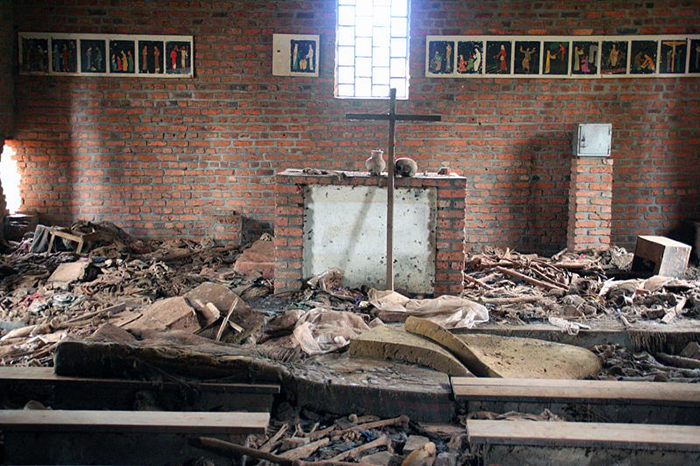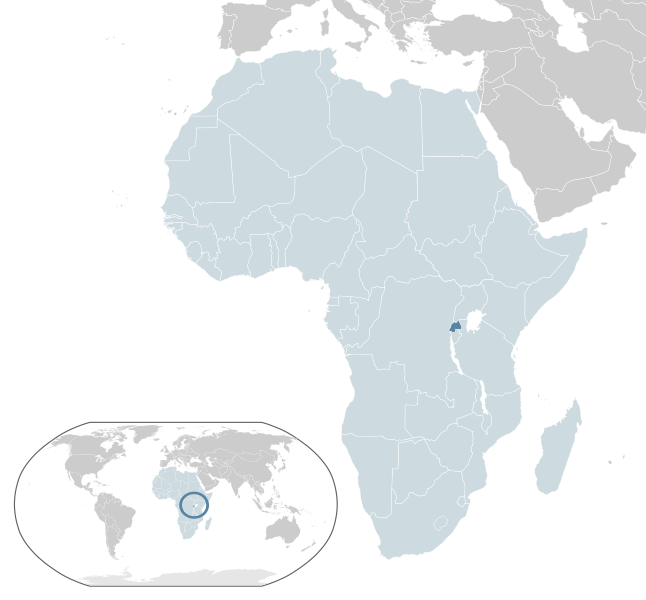「ルワンダ虐殺」が1994年4月6日に発生して25年になる。
ルワンダ共和国はアフリカの中央部にあり、フツ、ツチ、トゥワという民族が共存している。ドイツやベルギーの植民地だったが、62年に独立。しかし、それ以前からフツとツチの抗争が繰り返されていた。独立後、多数派のフツが政権を握り、少数派のツチを迫害する事件がたびたび発生した。94年4月のハビヤリマナ大統領暗殺をきっかけに、フツ過激派がツチとフツ穏健派を虐殺し、同年7月までの約100日間に80~100万人の犠牲者(ルワンダ全国民の20%)が出たといわれる。
2012年の国勢調査によると、カトリックは人口の43・7%、プロテスタントは37・7%、セブンスデー・アドベンチストが11・8%、イスラム教徒2%(2001年の統計によれば、カトリックは56・5%、プロテスタントは26%、セブンスデー・アドベンチストが11・1%。イスラム教徒4・6%とプロテスタントが伸びている)。(編集者注)
フツ過激派が100日間に少なくとも80万人のツチ族を殺害した「ルワンダ虐殺」から25年が経った。虐殺では、女や男、幼児、そして子どもが手榴弾や機関銃で襲撃され、マチェット(山刀)で切り倒されて首を切られ、生きたまま燃やされた。

ントラマ教会では、5000人もの避難民が虐殺された。聖堂には毛布や子どもの靴、遺骨が散乱し、祭壇には頭蓋骨が残されている。(写真:Scott Chacon)
デニス・ウイマナさんは夫を虐殺で失い、虐殺が自宅に押し寄せたタイミングで3人目の息子を産んだ。虐殺のサバイバー(生き延びた人)に物質・精神の両面でのサポートを提供することを使命とし、自ら設立した団体「イリバ・シャローム・インターナショナル」の働きを通してフツとツチの和解に尽くしてきた。ウイマナさんの回顧録『赤い大地から──ルワンダの癒やしと赦(ゆる)しの物語』について、「インターナショナル・ジャスティス・ミッション」顧問で作家でもあるベサニー・ホアン氏がウイマナさんにインタビューを行った。
[toggle]It has been 25 years since the Rwandan genocide, when Hutu extremists murdered at least 800,000 Tutsis over the course of 100 days. Women, men, infants, and children were assaulted with grenades and machine guns, cut down with machetes, beheaded, or burned alive. Denise Uwimana, who lost her husband to the genocide (and gave birth to a third son as the slaughter reached her home), has made it her life’s mission to provide material and spiritual assistance to fellow survivors and promote reconciliation between Hutus and Tutsis—in part through the organization she founded, Iriba Shalom International. Bethany Hoang, an author and advisor with International Justice Mission, spoke with Uwimana about her memoir, From Red Earth: A Rwandan Story of Healing and Forgiveness. [/toggle]
──自分や子どもの命が危険にさらされていた100日もの間、あなたはどのようにして希望を持ち続けることができたのでしょうか。
[toggle]How did you hold on to hope during those 100 days, as you feared for your life and your children’s lives? [/toggle]信仰者であるからといって、私が苦しみを受けずにすんだということはありませんが、イエス様に対する私の信仰は揺るぎませんでした。イエス様は人生の最後まで、どんな状況でも私たちと一緒にいることを示してくださいました。私はそのことを友人のオスカーから知ることができました。彼は私たち家族の友人でしたが、フツの兵士に殺される寸前、彼は私のために祈ってくれたのです。
[toggle]Being a believer did not spare me from tribulation, but my faith in Jesus remained firm. He showed me that he is with us in every situation, up to the final minute of life. I saw this in Oscar, a Tutsi and friend of my family, who prayed for me before the Hutu paramilitary killed him. [/toggle]虐殺が猛威を振るっている時、「神様はフツだけを愛しているんだ」と思いました。ツチはハエのように殺され、誰も私たちを守ろうと声を上げてくれなかったのです。また、教会の指導者が直接・間接に殺害に関わったことに私は失望しました。
[toggle]During the worst of the genocide, I thought God loved only the Hutu, because Tutsis were killed like flies, and no one raised their voice in our defense. I was disappointed at how church leaders were involved directly or indirectly in the killing. [/toggle]私にとって祈りは神様への訴えになりました。詩編118編の約束を神様に思い出してもらおうとしました。「人間に頼らず、主を避けどころとしよう」(8節)。私は神様に言いました。「誰も私のことを助けてくれません。あなたの言葉が真実か、殺人者に囲まれながらも生き延びられるかを見たいのです」。神様は約束を守ってくださり、私は生き延びることができましたが、それは私が良い人間だったからでも、たくさん祈ったからでもなく、ただ神様の恵みです。
[toggle]My prayer life became a quarrel with God. I reminded God of the promise he makes in Psalm 118, “It is better to take refuge in the Lord than to trust in humans” (v. 8). I told him, “I don’t have anyone to help me. I will see if your word is true and how I will survive among the killers.” God kept his promises, and I survived, not because I was better or because I prayed a lot but by his grace. [/toggle]
──その後の数年間、あなたはどのようにして他のサバイバーと関わり、関係を築くエネルギーを持てたのでしょうか。
[toggle]In the years following, how did you find the strength to serve and pursue relationships with other survivors? [/toggle]
ほかの未亡人と出会う前、私は「自分がいちばん苦しんでいた」と思っていました。やがて私は、強姦された女性やエイズに苦しむ女性のことを知りました。子どもをすべて失った未亡人や、片親や両親を失った孤児に出会いました。私たちはお互いを支えるために連携をとり、わずかな持ち物を分かち合いました。
[toggle]Before I met other widows, I thought I had suffered more than others. Then I learned of women who had been raped or infected by HIV/AIDS. There were widows who lost all their children and orphans who lost at least one parent. We organized to support each other, sharing what little we had. [/toggle]1999年、私はルワンダの首都キガリに引っ越しました。そこで、トラウマを抱えた未亡人や孤児に対する想いが強くなりました。私が訪問した家ではどこでも、信頼できる誰かが時間をかけて話を聞いてくれると、喜びで顔を輝かせてくれました。
[toggle]In 1999 I moved to Kigali, Rwanda’s capital, where my love for other traumatized widows and orphans grew. In every home I visited, I saw how their faces shone with joy because someone whom they trusted took time to listen. [/toggle]私は再婚した後、ルワンダからヨーロッパへ引っ越しました。しかし、サバイバーを想う情熱が失われることはありません。義理の母は8人の息子を亡くしましたが、彼女のもとを訪ねたとき、ほかの未亡人の話を聞くことができました。あるとき、二人の未亡人が連れて行ってくれたところは、幼い息子を自分の目の前で殺された場所でした。そこでは73人の男児が殺されたといいます。私は一晩中涙を流し、どうすれば手助けになれるだろうかと頭を悩ませました。すると心の中でこう聞こえたのです。「ただ彼女たちを愛しなさい! 『私が神である』と彼女たちに見せなさい。私は彼女たちを愛し続けている。彼女たちは私の証人となるだろう。悲しみのうちに死なせてはいけない」
[toggle]After I remarried, I moved from Rwanda to Europe, but my heart kept burning for survivors. When I returned to visit my mother-in-law, who lost eight sons, I had the opportunity to hear other widows’ stories. During one visit, two widows brought me to where their baby boys, among 73 infant boys, were killed in front of their eyes. I spent the whole night weeping and wondering how I could help. Then an inner voice said, “Just love them! Show them I am God. I still love them, and they will be my witnesses. Please don’t let them die in grief.” [/toggle]大虐殺によって教会は信頼を失っており、ほとんどの未亡人や孤児は教会に戻ろうとはしませんでした。しかし、私たち一人ひとりの命が助かったのには何か目的があるという確信が私にはありました。それは、同じ恐怖に苦しんだ他の人々を励まし、この社会に赦しと癒やし、和解をもたらすことです。(後編に続く)
[toggle]Most of the widows and orphans did not want to attend any church again, as the church had lost its credibility through the genocide. But I was convinced that each of us had survived for a purpose: to encourage others who had suffered the same horrors and bring forgiveness, healing, and reconciliation to our society. [/toggle]
